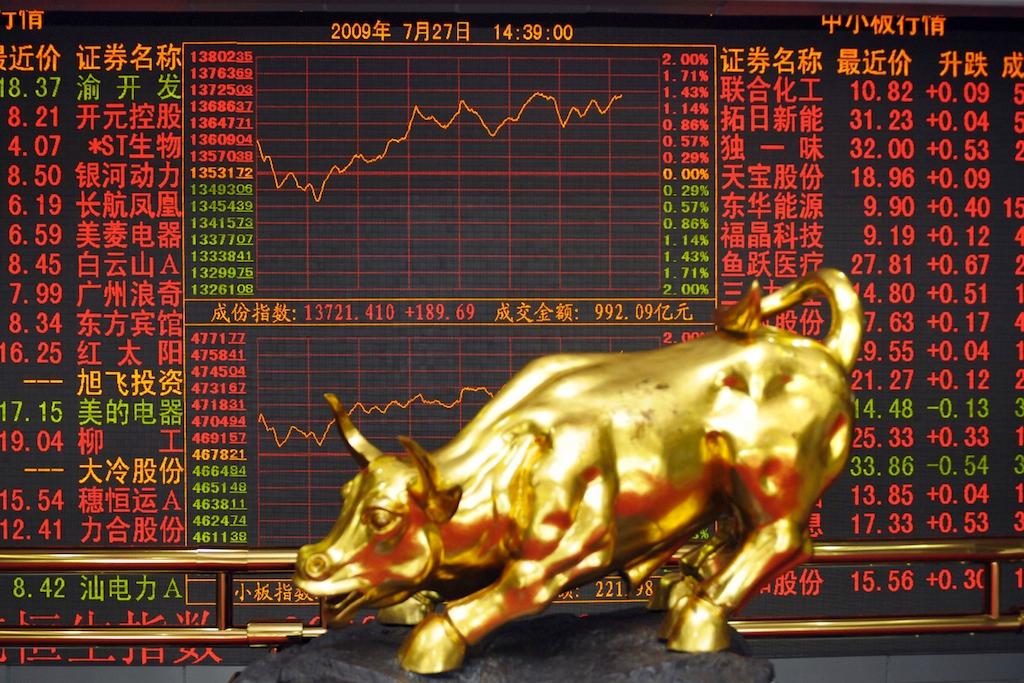China: Year of Snake could be a bull
This picture shows the Shenzhen Stock Exchange (SSE) golden bull and index board in Shenzhen on July 27, 2009.
The long-awaited recovery in Chinese stocks is here to stay, with the Shanghai Composite Index building on the surge seen late last year. Now analysts are expecting it to rally further, up to 30 percent in the Year of the Water Snake.
Until December, when the market jumped over 14 percent, it had been a disappointing year for Chinese equities with the Shanghai index touching lows not seen since the financial crisis, as concerns over slowing growth in the world's second-largest economy hit investor sentiment.
(Read More: How Long Will China Stocks Be Stuck in a Rut?)
But as 2012 came to a close the market erased earlier losses posting a more than 3 percent gain for the full year on improving economic data. Since the start of 2013 stocks have rallied 7 percent and analysts tell CNBC that the China bulls' time in the sun is going to last.
30 Percent Pop
Kerry Series, founder and CIO of Eight Investment Partners, said the Chinese stock market should be trading at 30 percent above its current value by the end of 2013.
(Read More: How to Trade a Chinese Recovery)
"The fact is that China's growth is re-accelerating. We think the average Asian stock market ought to rise, or needs to rise, by 20 percent to get to the long-term average valuation. In China's case we think it ought to rise by more than that, so we could easily see a rise of 30 percent in Chinese stocks generally," Series told CNBC's "Cash Flow" on Tuesday.
Encouraging economic indicators have emerged from China since the start of the year, after government official data showed growth had picked up to 7.9 percent in the final quarter of 2012, up from 7.4 percent in the previous quarter. The leadership transition has also fueled hopes of much anticipated market reform and the opening up of the market to more foreign investment.
(Read More: China's New Leader – Harbinger of Reform?)
Ryan Tsai, senior investment analyst at Coutts, told CNBC's Asia "Squawk Box" that he expected a further rally on the China's stock market of up to 20 percent. His bullish outlook was based on an improving economic outlook and reasonable stock valuations.
Chinese stocks are currently trading at around 12.2 times price to earnings, compared to Hong Kong's slightly under 12 times and Japan's 19.2 times.
"We expect 15 to 20 percent upside by the end of the year. The Shanghai Composite could hit between 2,800 and 3,000," said Tsai. The index was trading around 2,390 by mid-day on Tuesday.
Philip Chan, Chinese equity strategist at Shenyin Wanguo Securities, said a "20 percent pop" within 2013 was not impossible, but added it was important to highlight that the Shanghai Composite has already seen a good run.
"The market is already up 22 percent on its early December low," said Chan. "However, I would say a 20 percent pop is still possible. Markets are focused on two crucial NPC [National People's Congress] meetings in March, where some incremental policy changes – such as policies to promote alternative energy, or the financial markets, could have the potential to provide a boost to markets," he said.
(Read More: How China's Changed Since the Last Leadership Shift)
"Policies could be introduced to help consolidate the overcapacity in solar energy panel market, for example, or there could be policies which explain more about future changes to the Hukou system [the government's household registration system], which will have implications on land/property and therefore on downstream sectors related to property," he added.
China's new leadership led by Xi Jinping will also take official charge in mid-March. The positive impact of the leadership change has already been priced into Chinese stocks, said Chan, but the announcement of policy details could still move markets.
How to Play the Rally
Chinese equity strategists are focusing on cyclical stocks to play the uptick in the market. "Cyclicals, such as copper, steel, oil & gas will all do well. Lots of cyclical stocks are related to the property sector. So if the property sector continues to do okay, which is broadly expected, these sectors will also do well," said Chan.
Coutts' Tsai also backed cyclicals including financials: "The big theme this year, at least for the first-half, is we want to be overweight cyclical sectors. We are not structurally positive on banks but we see the economy improving and banks are the way to play that," he said.
(Read more: Why It's Time to Buy China Bank Stocks)
Tsai said the largest downside risk to China's growth this year would be if the government moved to tighten its monetary policy sooner than expected.
"This would be because of a rise in inflation and in property prices. That would lead the policymakers to want to tighten," said Tsai.
Last year China's central bank cut interest rates in June and July and has also eased monetary policy by lowering reserve ratio requirements for banks three times since November 2011.
Chinese inflation eased to 2 percent in January, down from a seven-month high in December of 2.5 percent. Consumer prices have fallen steadily from a high of 6.5 percent in July 2011.
More from our partners, CNBC:
CNBC: Shop less, fashion designer says
CNBC: Billionaire Green plans 10 new Topshop stores in US
CNBC: Adidas hopes to boost sales with high-tech sneaker
Every day, reporters and producers at The World are hard at work bringing you human-centered news from across the globe. But we can’t do it without you. We need your support to ensure we can continue this work for another year.
Make a gift today, and you’ll help us unlock a matching gift of $67,000!
